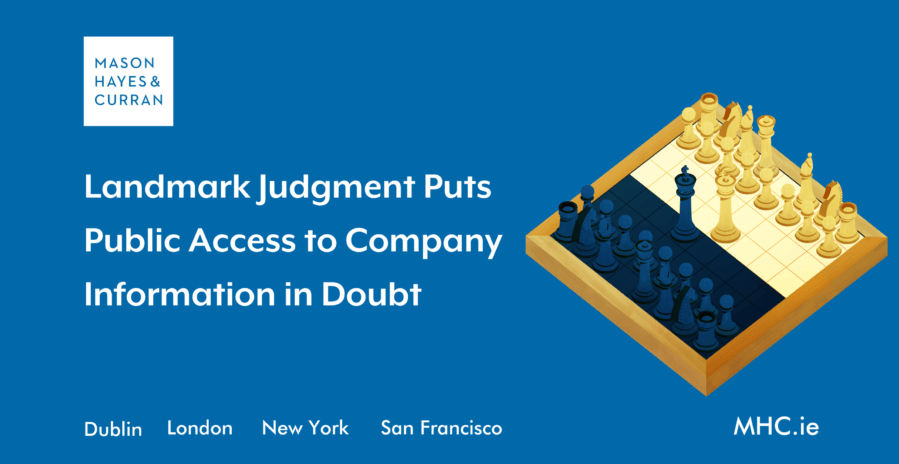Public Access to Company Information in Doubt

In a recent landmark judgment, the European Court of Justice put public access to information about company ownership and control into doubt.
The Court ruled that the unfettered right of public access to the personal information of the individuals who ultimately own or control companies incorporated in EU Member States is incompatible with the European Charter of Fundamental Rights.
Irish law, which transposes EU anti-money laundering measures, gives the public an unqualified right to access the name, month and year of birth and country of residency of those individuals on the payment of a fee. The only exception made is for minors, where the applicant for information must show why their request is in the public interest.
The judgment also has potentially wider ramifications. The registers of beneficial ownership are not the only registers which Irish companies are required to keep – all companies must also keep registers of their members, their directors, their secretaries, and the interests of directors and secretaries, and their families, in company shares and bonds. These registers contain names and home addresses of directors and secretaries, and in many cases, those of shareholders. Not only is access required, but companies must provide copies of this information on payment of a modest fee. Much of this information is then publicly filed in the Companies Registration Office (CRO).
The detail
The right of access to the information in all cases, that is, without having to explain or show why the information is requested, has been ruled invalid. The judgment recognises that there are good reasons for information on beneficial ownership of companies to be collected – namely the combatting of money laundering and terrorist financing. However, the Court also states that this must be balanced against an individual’s rights to a private life and the protection of personal data. The Court suggests, therefore that any person wishing to access the data must demonstrate a “legitimate interest”. A person wishing to access information on the Register of Beneficial Ownership of Trusts in Ireland must already demonstrate a “legitimate interest”.
A similar provision applies to requests to inspect a company’s register of members in the UK, where any applicant must submit a request for access which satisfies a “proper purpose” test and which includes disclosure of the purpose for which the applicant intends to use the information and whether the information will be disclosed to another person and if so, to whom. It is an offence for an applicant knowingly or recklessly to make a false or misleading statement on a “proper purpose” request.
The Court of Appeal in the UK has found that a company receiving a “proper purpose” request is entitled to consider whether the purpose of the request is in the interests of its shareholders.
In the light of the judgment, a similar provision in Irish law, or the extension of the “legitimate interest” test which applies to the beneficial ownership of trusts, looks likely.
For more information on the likely impact this judgement will have on your organisation, contact a member of our Corporate or Corporate Governance & Compliance teams.
Read more about this judgment on Irish Legal News or the Law Society of Ireland Gazette.
The content of this article is provided for information purposes only and does not constitute legal or other advice.
Share this:





